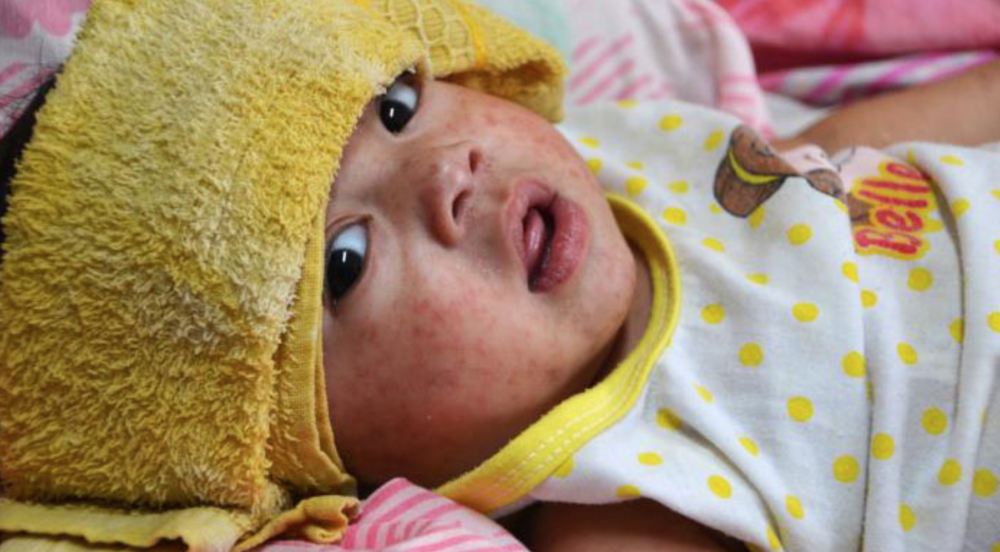Advertisement
'Immune Amnesia': Why Measles Is Dangerous For Years After Catching It, Study Shows
Resume
After the vaccine against measles came into widespread use in the 1960s, something strange happened.
"Wherever the vaccine was introduced, there were large reductions in childhood deaths" — deaths not just from measles, but from other illnesses like pneumonia, says Dr. Michael Mina from the Harvard Chan School of Public Health and Brigham and Women's Hospital.
One possible explanation was that the measles vaccine boosted a child's overall immune system.
"But the other side of the coin was that maybe actually the vaccine was unmasking a much worse immunological detriment or problem associated with measles," he says.
And that's what he and colleagues show in a new study just out in the journal Science.
The research finds that measles, which kills more than 100,000 children a year around the globe, is an even more dangerous germ than previously thought. It can cause what the scientists call "immune amnesia:" Children who catch the measles can lose resistance they had built up to other illnesses.
"The measles virus is much more deleterious than we ever imagined," says Dr. Stephen Elledge, a professor of genetics at Harvard Medical School and Brigham and Women's. "It's much more dangerous to children who get it, not only when they get it but for years afterwards."
"In fact," Elledge says, "when it infects children who have not been vaccinated, it destroys large parts of their immune system. And that generates a situation which is 'immune amnesia.'"
Amnesia, meaning that measles erases the body's memory of enemies, leaving fewer defenses — antibodies — against germs it has battled before.
The researchers used new technology that can detect hundreds of antibodies against different viruses in blood.
"So from a drop of blood, we can tell your entire history of viral infection," Elledge says.
The blood used in the study came from a group of Dutch orthodox protestants who do not believe in vaccinating their children, Dr. Mina says.
"Unlike a lot of people who choose not to vaccinate in the United States, in that community they were very willing to participate in science," he says.
And with a local measles outbreak under way in 2013, they were willing to let Dutch researchers take blood samples from children before and after getting measles. Grad student Tomasz Kula compared the "before" and "after" samples, and emailed Mina with the first results.
"He just sent a one-line sentence that said: 'It's funny, we saw a big drop in antibodies to everything other than measles,'" Mina says. "And that to me was the 'aha moment.' Yes, it worked!"
And yes, measles does deplete antibodies against other illnesses, though the study shows that the extent of that depletion varied quite a bit among the 77 children, from 11 percent to 73 percent.
The measles vaccine does not have this depletion effect, the researchers say.
Prof. William Moss, a global vaccine expert at the Johns Hopkins Bloomberg School of Public Health who was not involved with the paper, says it is the most sweeping study yet of the impact that measles has on the antibodies that protect us from diseases.
"What this study is showing is that after measles, children lose both the diversity of their antibodies and the abundance, the amount of these antibodies," he says.
The findings highlight the value of the measles vaccine, he says, at a time when vaccination rates have dipped.
Public concern about some parents' refusal to vaccinate their children has been rising in the wake of recent outbreaks in the United States and elsewhere. Cases of measles worldwide are "are increasing sharply—by more than 30% globally from 2017 to 2018—because of undervaccination and misguided vaccine safety concerns," an accompanying piece in Science says.
"By preventing measles," Moss says, "you prevent not only sickness or perhaps death from measles, you're actually protecting the child against other infectious diseases because of this impact that measles virus has on the immune system."
The researchers say it could take years for a child's immune system to recover fully from the effects of measles.
And their findings suggest that perhaps children who catch measles should repeat any vaccines they'd had before, because the immunity may have been erased.
The World Health Organization estimates that measles vaccines have saved at least 21 million children's lives since the year 2000. The researchers say if the new findings on the long-term effects of measles are factored in, that number could actually be much, much higher.
This segment aired on November 1, 2019.
